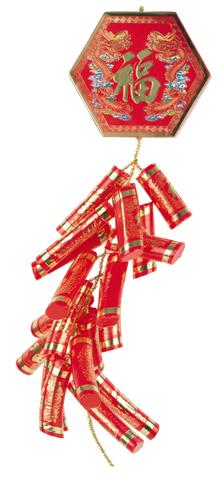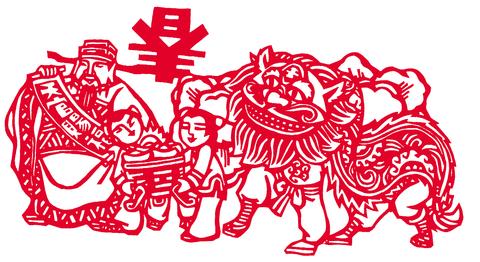People do like to talk about the customs one is suppose to observe on Lunar New Year, but then that is probably because so few of them are now observed anymore. There is a quality of nostalgia about the quaint customs that gave the Lunar New Year its significance. But it is nostalgia that tends to emphasize how much of the complex symbolism, ritual and taboos have become irrelevant for the majority of modern Taiwanese.
But as with the many family reunions that are taking place all over the island, there is a little space for some nostalgia here about what Lunar New Year once entailed.

It is naturally important to get off to a good start, for your luck during the whole year may depend on it. Getting a horoscope was important for determining your actions on the first day of the New Year. Firecrackers would be lit at the "correct" time, and offerings of sweets placed at the family shrine. In order to make sure all this was done at the exact moment, families would stay up all night -- although this has become more an excuse to play mahjong all night.

The next step is to make sure that you leave the house by the correct door. The correct direction is determined by your horoscope, but in these days of high-rise apartment, compliance can be problematical. The serving of sweets and "auspicious" foods such as red dates to relatives and friends is prescribed through this day, as is the repetition of auspicious phrases such as "eat red dates for a prosperous year" (
Taboos are also a big part of Lunar New Year's day, with bad luck associated with the accidental breaking of crockery. Most cooking of festival cakes is done before this day as burning these cakes by accident will bring bad luck. The use of white sugar is considered unlucky (white is a funeral color).
A wife's return to her family home comes second in importance only to a son's return to his. But, superstition has it that for a woman to return home on the first day of the New Year will make her family poor, this visit is normally avoided until the second or on the 12th day, which is specially set aside for this visit. Elaborate gifts were once given by the man's family to his wife's, all with abstruse symbolic meanings -- but much of the gift giving has now been replaced by the one gift serves all red packet and hongpao (
Traditionally, the third day of New Year was a "red dog day" (赤狗日), considered unlucky for doing virtually anything other than sleeping or gambling at home. Leaving the house at all was to doom the family to penury for ever -- but with many company's opening for business on the fourth day, few now can afford the luxury of this enforced confinement and you'll see plenty of people out and about.
The third day of New Year, according to fable, is also the day of the mice's wedding (老鼠娶親), and in order to give the rodents a little privacy for their nuptials, an early night is prescribed for all. In some families, rice and salt would be scattered about the floor in a kind of red packet for the mice, although why you wanted to encourage the things has yet to be explained.
One the fourth day, the kitchen god, who was sent off to make his report to the emperor of heaven on the 24th day of the previous month, is welcomed back with due ceremony. In a traditional song about the New Year -- in the style of "On the first day of Christmas" -- "on the fourth day you eat your fill" (初四頓頓飽), but how this is distinguished for the excessive eating and drinking of the previous days isn't clear. In any case, the kitchen god is generally welcomed in the afternoon, as his arrival returns the family to a state of divine oversight.
It is on the fifth day of New Year that shops traditionally open for business after the festivities, in a flurry of firecracker explosions.
The sixth and seventh day pass in a relatively low key fashion, but this is just the run up to the nativity of the King of Heaven (天公生) on the ninth day, one of the most public events of the Lunar New Year -- which for much of its duration focuses on the home. The rites for the king of heaven are very solemn, and to make up for this, the tenth day is customarily also given over to feasting.
The 11th day is the day for the son-in-law to visit his wife's family (子婿日) and the 12th day the wife returns to the bosom of her family (歸寧). This formal visit to the in-laws naturally entails the consumption of much food and drink, so the 13th day is set aside for recovery and the eating of congee. But this is only the briefest of breaks before the commencement of the lantern festival (元宵節) on the 14th, which brings the almost month-long celebrations of the Lunar New Year -- which began at the winter solstice -- to an end.

This is the year that the demographic crisis will begin to impact people’s lives. This will create pressures on treatment and hiring of foreigners. Regardless of whatever technological breakthroughs happen, the real value will come from digesting and productively applying existing technologies in new and creative ways. INTRODUCING BASIC SERVICES BREAKDOWNS At some point soon, we will begin to witness a breakdown in basic services. Initially, it will be limited and sporadic, but the frequency and newsworthiness of the incidents will only continue to accelerate dramatically in the coming years. Here in central Taiwan, many basic services are severely understaffed, and

Jan. 5 to Jan. 11 Of the more than 3,000km of sugar railway that once criss-crossed central and southern Taiwan, just 16.1km remain in operation today. By the time Dafydd Fell began photographing the network in earnest in 1994, it was already well past its heyday. The system had been significantly cut back, leaving behind abandoned stations, rusting rolling stock and crumbling facilities. This reduction continued during the five years of his documentation, adding urgency to his task. As passenger services had already ceased by then, Fell had to wait for the sugarcane harvest season each year, which typically ran from

It is a soulful folk song, filled with feeling and history: A love-stricken young man tells God about his hopes and dreams of happiness. Generations of Uighurs, the Turkic ethnic minority in China’s Xinjiang region, have played it at parties and weddings. But today, if they download it, play it or share it online, they risk ending up in prison. Besh pede, a popular Uighur folk ballad, is among dozens of Uighur-language songs that have been deemed “problematic” by Xinjiang authorities, according to a recording of a meeting held by police and other local officials in the historic city of Kashgar in

The People’s Republic of China (PRC) was out in force in the Taiwan Strait this week, threatening Taiwan with live-fire exercises, aircraft incursions and tedious claims to ownership. The reaction to the PRC’s blockade and decapitation strike exercises offer numerous lessons, if only we are willing to be taught. Reading the commentary on PRC behavior is like reading Bible interpretation across a range of Christian denominations: the text is recast to mean what the interpreter wants it to mean. Many PRC believers contended that the drills, obviously scheduled in advance, were aimed at the recent arms offer to Taiwan by the